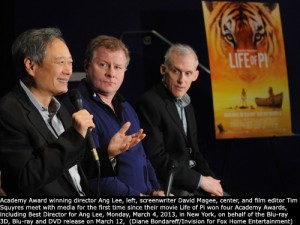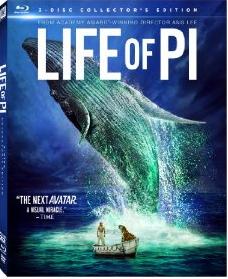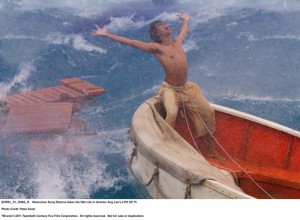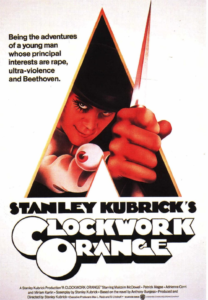On March 12th, Ang Lee’s extraordinary Life of Pi arrives on Blu-ray and DVD with many special features that delve into the making of this challenging and visually stunning film. Life of Pi tells the story of Pi Patel, a boy whose sent adrift on a lifeboat after a disastrous ship sinking with only a bengal tiger to accompany him in his struggle for survival. Life of Pi took home the most Academy Awards for a single movie at this year’s awards (for Best director, cinematography, visual effects and musical score) and director Lee joined his editor Tim Squyres and writer, David Magee in New York this past week to talk about bringing Yann Martel’s novel to the screen.
 People compare the level of immersiveness in this film’s 3D with Avatar’s. At what point in the development process did you decide to do it in 3D and how did that affect the writing?
People compare the level of immersiveness in this film’s 3D with Avatar’s. At what point in the development process did you decide to do it in 3D and how did that affect the writing?
Ang Lee: In the very beginning when we think about the structure of the script, I thought of the 3D thing. Which was about six months, nine months, before Avatar was released.
David Magee: Yea we hadn’t seen Avatar yet–we were talking about 3D in our first dinner together.
Tim Squyres: We had saw a bunch of 3D movies, good ones and bad ones…
Ang Lee: I think the success of Avatar did two things for us. One is really legitimizing 3D as a storytelling tool. I think that’s a huge jump, James Cameron really pushed that. We wouldn’t have that argument. The second thing was it helped us arguing with the studio which, they say, ‘this is literature, this is not [an] action movie, why would …you want to add like a quarter [of the budget] just to do 3D, why?’ I think our film will help film makers make the same argument such as we took it from Avatar...I really give James Cameron the credit to elevating the 3D into a storytelling tool. I think that’s a huge step and I think everybody will just add things on top of that. We learn new things. I think the way it was used was very conservative. I think we could do more but everybody’s doing what we think is good for the audience at that time…This is not a mature language yet. We’re still sort of finding it. Establishing it.
With the amount of features on the Blu-Ray sort of pulling back the curtain on the whole process, do you think this makes audiences more appreciative of what they see? Or do you think it takes a little bit away?
Tim Squyres: There’s still lots of secrets. We’re not giving everything away!
David Magee: There are also two kinds of people in the world: There are people who like to watch a magic trick and go ‘I don’t wanna know how they did that’ and there are people who like to watch a magic trick and figure out how it’s done. And I think it’s totally appropriate for either of those people–look, if you’re the one who doesn’t want to know, don’t watch those extra features. Clearly we’re going to show you how this works, just stop.
Ang Lee: I don’t mind sharing How-to. I think that’s really fun and it’s educational for young filmmakers…I think really the mystery is in the charm, the spirit of the story. In the performance. I wouldn’t share how I deal with actors. What they go through. I would share very limited of that artistic thinking, how I hold a story, how I examine that within the film’s structure. People ask me about symbolism…and I staple it. I can not tell you, I am not going there. But I think the making is fun.
While young Pi Patel was played by new comer Suraj Sharma, the older version of Pi was portrayed by film veteran Irrfan Khan (Amazing Spider-man, Slumdog Millionaire) Did Suraj get to interact with Khan at all in order to discuss their takes on the character?
Ang Lee: A little bit, he’s still starstruck by Irrfan Khan, he’s just like the best actor taboo. So he idolized him. Not that [Suraj] ever acted before but you know, he’s a smart young man, so he knows there’s the real-deal for acting. He looked up to them. I gave him personal acting lessons and of course acting with those wonderful actors was help. I think most of all he has the ability to just believe in a situation and respond accordingly. And he has a really soulful face. There’re people that are just–I think I have a good grasp on if that works cinematically or not. That’s kind of the person, people act for him.
How was the audition process for Pi?
Ang Lee: There’s no sixteen year old movie stars, so we got to get someone new. So we know the deal. I think before we meet the boy, it’s very hard for a company to commit to a project, the expense, it would be hard for me too. Even if I already have the script, if you don’t have the boy you believe in, then you don’t have a movie, we should probably just drop it. I think I was pretty lucky…when I see Suraj, I don’t know, he looks like Pi to me…His face is full of possibilities. The deep, profound way he looks when he is thinking… I’ve done movies long enough and I think I’m also talented enough to know, to tell, to trust a thing. This is the third time in a role I’m making a movie with…a first-timer lead to carry a movie. I think it’s a matter of you believing them and then you check whether they have the ability to believe in what they’re told. I tested him. He looks right and I tested him, [his was] the most poignant reading I’d experienced with the screen test. I told him to tell the second story as if it’s for real like in his circumstances–the mother is your mother, you know, I gave some equations, it took a little while and then it just started. Halfway he’s crying–and for five minutes, eight minutes, he didn’t get out of the character. That’s tremendous talent. I don’t know what else you can–people got tears! And the casting director that’s shooting’s got tears in their eyes. When I showed that tape, that face, to the studio, they want to make the movie. One of the reasons they wanted to make the movie is we got that boy. So I don’t know what else you can trust. You gotta have some faith at some point, you got to take the leap of faith. But it’s instinct, quick impression, it’s also a quick calculation I guess. I can see that will work…He didn’t melt down, he didn’t get sick at all….The last three months we shot nothing but him. Every shot is him. We’re shooting all in order and he’s losing weight at the same time. At lunch time he’s doing crunches, we gave him a slice of apple. The last month he’s going kind of crazy!


Besides the fact that David Magee and Ang Lee, together, put a masterpiece of a film into history, The far and wide were touched. as the masterful script lead us into the questions of faith itself. when all else is lost only faith can deliver. It was a beautiful look at the Indian culture, where for many thousands of years have produced some of the greatest spiritual masters. The script reflects some of that, and Ang Lees direction to put that in motion, was for me a heart felt experience. so well done.